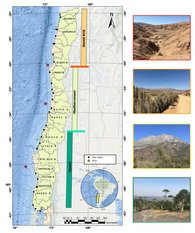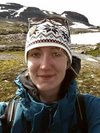Weathering and Erosion in Chilean Sedimentary Archives | SECCO
Deciphering the effect of climate and vegetation on erosion, weathering and sedimentary export is one of the main challenges in the study of Earth surface dynamics. In this joint project between the Freie Universität Berlin and GFZ-Potsdam, we are investigating the response of Earth’s surface to climatic changes in Chile.
More precisely, the SECCO project aims to understand how the Chilean landscapes and their associated sedimentary systems responded to the general aridification taking place in Chile since the Last Glacial Maximum. The main goal of the project is thus to reconstruct changes in hydrological conditions, vegetation patterns, weathering intensity, and erosion rates during this time period and understand how these processes impacted the sedimentary systems in Chile.
To study each of these earth surface processes separately, the project uses a broad suite of geochemical proxies, consisting of leaf wax n-alkanes (Vegetation and hydrology proxy), 10Be/9Be (proxy for erosion), Lithium isotopes (proxy for weathering intensity).
In order to assess the sensitivity of these state-of-the-art proxies in the Chilean context and evaluate the preservation of these terrestrial signals in the marine sedimentary records, the SECCO project is subdivided in two sub-projects.
1) The first sub-project is focused on calibrating and characterizing the proxies using modern riverine and marine surface sediments along the climatic gradient of Chile. This sub-project assesses the sensitivity of the proxies in different climatic zones on the continent and evaluates how these signals are transferred and preserved in marine surface sediments.
- PhD student: Nestor Gaviria-Lugo, supervised by Hella Wittmann-Oelze, Dirk Sachse, Patrick Frings (GFZ) and Anne Bernhardt (FU Berlin).
2) The second sub-project targets changes in the environmental and climatic conditions since the Last Glacial Maximum in Chile. Here, we are using sedimentary archives from three gravity cores located offshore Chile to evaluate how vegetation and hydrological patterns modulated the sediment export to the ocean. In addition to the paleo-reconstruction, a large part of this sub-project consists in evaluating how early diagenesis affects the geochemical proxies used in this project.
- PhD student: Charlotte Läuchli, supervised by Anne Bernhardt (FU Berlin), and Hella Wittmann-Oelze, Dirk Sachse, Patrick Frings (GFZ).
The SECCO project is funded by the DFG and is part of the second phase of the SPP project EarthShape.
Time Frame
- 2019 - 2021
Funding
- DFG proposal “The coupled vegetation, weathering, erosion, and sediment-export response to climate change unraveled from novel proxies in Chilean marine sediment” (WI 3874/7-1)
- DGF – SPP EarthShape
Publications
Gaviria-Lugo, N., C. Läuchli, H. Wittmann, A. Bernhardt, P. Frings, M. Mohtadi, O. Rach, and D. Sachse (2023), Climatic controls on leaf wax hydrogen isotope ratios in terrestrial and marine sediments along a hyperarid-to-humid gradient, Biogeosciences, 20(21), 4433-4453, doi:10.5194/bg-20-4433-2023.





